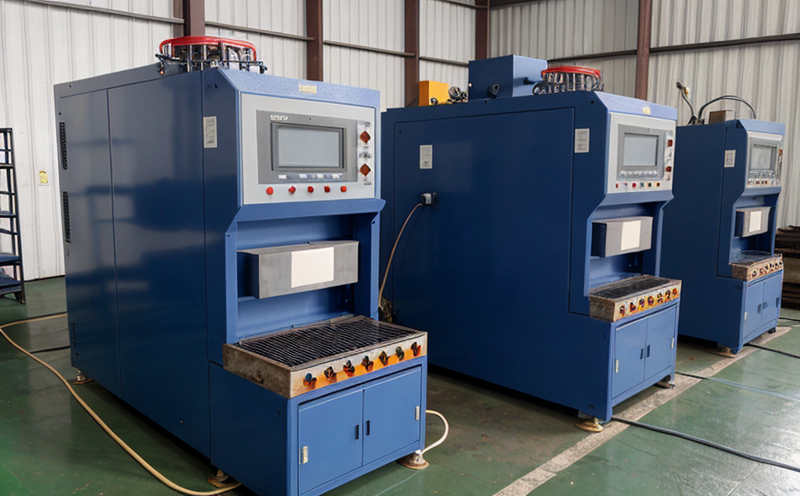ASTM E415 Carbon and Alloy Steel Chemical Analysis Testing
The ASTM E415 standard specifies the procedures for determining the chemical composition of carbon and alloy steels. This service is crucial for ensuring that steel products meet the required specifications for performance, safety, and compliance with relevant regulatory standards.
Carbon and alloy steels are widely used in various sectors including automotive, aerospace, construction, and manufacturing due to their strength, durability, and versatility. The chemical composition of these materials directly influences their mechanical properties such as tensile strength, yield strength, elongation, and hardness. Therefore, accurate and precise chemical analysis is essential for quality control and ensuring product reliability.
The ASTM E415 testing process involves the following steps: sample preparation, sampling location, heating method, analysis methods, and reporting of results. Samples are typically taken from raw materials or finished products using standardized procedures to ensure representativeness. The chemical composition is determined through various analytical techniques including but not limited to atomic absorption spectroscopy (AAS), inductively coupled plasma optical emission spectrometry (ICP-OES), and X-ray fluorescence (XRF). The results are reported according to the ASTM E415 standard, providing a comprehensive breakdown of all critical elements present in the steel.
Accurate chemical analysis not only ensures that the product meets the specified requirements but also helps identify any potential issues early in the production process. This prevents costly reworks and ensures that materials used meet the stringent quality standards required by industry stakeholders. Compliance with ASTM E415 is essential for manufacturers who must adhere to international standards, ensuring their products are safe, reliable, and perform as expected.
The testing methodology described in ASTM E415 has been refined over decades of use and is recognized globally for its reliability and accuracy. By adhering to this standard, laboratories can provide consistent and repeatable results that are trusted by industry professionals. This service supports the quality control processes of manufacturers, ensuring that every batch of steel produced meets the highest standards.
Customers benefit from ASTM E415 testing in several ways. Accurate chemical analysis ensures product reliability, enhances safety, reduces waste, and minimizes compliance risks. By leveraging this service, businesses can maintain a competitive edge by delivering superior quality products to their customers. Additionally, adherence to international standards like ASTM E415 builds trust with partners and stakeholders, fostering long-term relationships in the industry.
Benefits
The benefits of ASTM E415 Carbon and Alloy Steel Chemical Analysis Testing extend across multiple dimensions, including quality assurance, compliance, and customer satisfaction. By ensuring that carbon and alloy steels meet the specified chemical composition requirements, this service enhances product reliability and safety, reducing the risk of material failures in critical applications.
Compliance with international standards such as ASTM E415 is essential for manufacturers who must adhere to stringent quality control protocols. This ensures that every batch of steel produced meets the highest industry standards, thereby minimizing compliance risks. The service also supports regulatory requirements, ensuring that all materials used are safe and reliable, which in turn builds trust with partners and stakeholders.
Accurate chemical analysis through ASTM E415 testing helps identify any potential issues early in the production process, preventing costly reworks and ensuring consistent product quality. This is particularly important for high-stakes applications such as automotive components or aerospace structures where even minor deviations can have significant consequences. By maintaining a consistent supply chain, this service supports long-term relationships with customers, suppliers, and partners.
The testing methodology described in ASTM E415 has been refined over decades of use and is recognized globally for its reliability and accuracy. This ensures that laboratories providing this service can offer consistent and repeatable results that are trusted by industry professionals. By leveraging the expertise of a reputable laboratory, manufacturers can ensure they are meeting all relevant standards and specifications.
In summary, ASTM E415 Carbon and Alloy Steel Chemical Analysis Testing provides numerous benefits to customers in industrial manufacturing and processing sectors. It enhances product reliability, ensures compliance with international standards, minimizes compliance risks, supports regulatory requirements, identifies potential issues early, prevents costly reworks, maintains consistent product quality, and builds trust within the industry.
Industry Applications
- Aerospace: Ensuring that critical components such as turbine blades or structural parts meet stringent chemical composition requirements to enhance safety and performance.
- Automotive: Verifying the quality of steel used in vehicle manufacturing to ensure durability, reliability, and compliance with industry standards.
- Construction: Guaranteeing that structural steel meets the specified chemical composition for long-term durability and safety in building projects.
- Manufacturing: Providing accurate chemical analysis for various industrial applications where precise material properties are crucial for performance and quality.
The ASTM E415 standard is widely recognized and used across these industries to ensure that carbon and alloy steels meet the required specifications. This service plays a vital role in maintaining high standards of quality control, which is essential for meeting customer expectations and ensuring product reliability.





